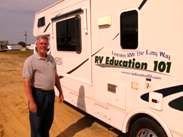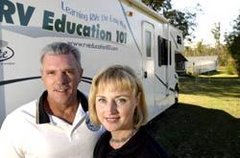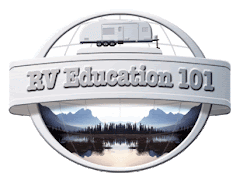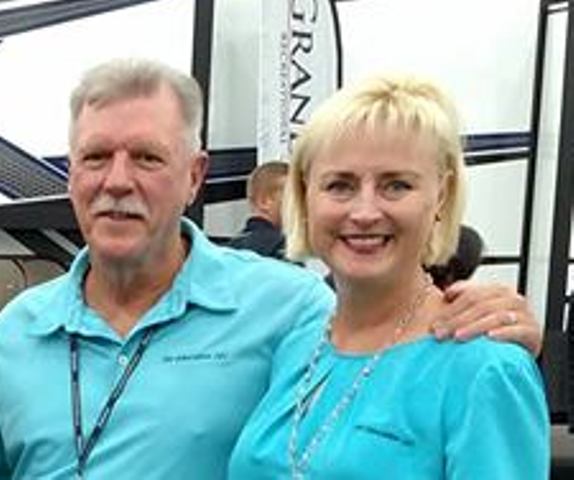Just about every campground you go to will have a list of rules that they request visitors to follow, just like the rules you probably have for your own household. Another list of rules that isn’t necessarily written anywhere is what is referred to as campground etiquette. These are the rules that RVers learn over time and practice out of respect for other campers, the campground owners and the environment. When you arrive at the campground you should always observe campground etiquette.
Be a Good Neighbor: This is a big one and it encompasses many areas surrounding your stay at the campground. When a campground gets busy it means more people, more RV’s, more children, and more pets, which usually equates to less personal space for everybody. One of the reasons we enjoy getting away in our RV is to get a little peace and quiet. Now it’s understandable for children, who are excited to be camping, to make some noise but there is a time and place for everything. Not everybody likes getting up early or staying up late, so you need to be considerate of other people around you.
Quiet Hours: Campgrounds have quiet hours and campers need to observe these quiet hours. During quiet hours you shouldn’t hear generators running or loud parties next door. If you arrive at the campground early in the morning or late in the evening, try to limit the amount of noise you make while getting set up.
Police your Area: In the military, “police call” meant to go through an area and pick up any trash and to keep your area looking clean and presentable at all times. This is a good rule for campers. Your neighbor, who in some cases is only 15 or 20 feet away, doesn’t want your trash to end up in their camping area. Try to keep your campsite organized and keep the trash picked up. Don’t let things like paper plates and paper cups sit outside, that can quickly end up next door. Trash and food left outside can also attract some unwanted guests like ants, mice, squirrels, raccoons, and even bears. Keeping your camp area clean and picked up will make this less likely to occur.
Fires and Fire Pits: If there is a fire restriction where you are staying never start a fire, even if there is a fire pit. Avoid putting trash in the fire pit too; if it isn’t wood it shouldn’t go in the fire pit. Trash in the fire pit can attract more unwanted guests. Never cut branches from a live tree, or the tree itself to use for fire wood. In many public campgrounds gathering firewood is strictly prohibited, check with the campground rules about fires and firewood. Many public and private campgrounds sell firewood for you to use for a campfire.
Always make sure the fire is completely out before leaving the area unattended, or retiring for the night. If you are a smoker avoid throwing cigarette butts on the ground. If conditions are right, and the cigarette butt is not completely out, it could start the entire forest on fire.
Instruct Children on Campground dos & don’ts: Children just want to have fun, but it shouldn’t be at the expense of other campers. Instruct your children not to run and ride bikes through somebody else’s campsite to take a shortcut to the swimming pool or the game room.
You are in essence renting the space you are in and it should be just that, your space. You should also explain to children that they need to be extremely careful when riding bikes, skateboards, scooters and running through the campground. There is constant traffic in and out of a campground, especially when it’s busy and not everybody is watching for small children. This is why adults should always go the speed limit too, which is usually 5 miles per hour in the campground area.
Security: Even though the majority of campgrounds you visit are for the most part safe and secure you shouldn’t leave your guard down too much. Leaving valuables sitting around the campsite unattended, or leaving your door open or unlocked is asking for trouble. Not everybody is as honest as you may be. Unsecured bicycles, scooters, video games, hitch work and other valuables can be an easy target for the not so honest camper.
Control your Pets: Pets and RVs just seem to go together, but keep in mind not everybody is a pet lover! If you have pets at the campground it is your responsibility to control them. First make sure you understand the campgrounds rules as it pertains to pets. Your dogs should never be outside unless they are on a leash. And even when they are on a leash you need to keep them out of other camper’s campsites. Use the campgrounds designated area for pets, if there is one, and always clean up behind your pets.
Control your dogs barking. I have seen instances where people leave their pet at the campground while they go on a day trip and the dog barks nonstop all day. It is your responsibility to control a barking dog. Don’t be surprised if you are asked to leave if your pet is out of control.
Respect the Environment: There are a lot of beautiful places for us to visit with our RV’s and it is up to us to protect these areas during our stay. Don’t litter or put trash into the streams, rivers and lakes. Don’t start a fire if there is a fire restriction, even if there is a fire pit. Never empty your gray or black water tanks anywhere except in specified dump stations and campground sewer systems. Always leave the campsite in the condition you found it or in a better condition than you found it in.
Reporting Problems: Campgrounds have camp hosts and campground managers who are available on site. If you have a problem with another camper or a campground staff member you need to address the problem with the camp host or manager and let them resolve it.
For more information on RV campgrounds check out our RV Campground Basics DVD
Happy Camping,
Mark Polk
RV Education 101
Follow us on Facebook
Subscribe to:
Post Comments (Atom)







No comments:
Post a Comment